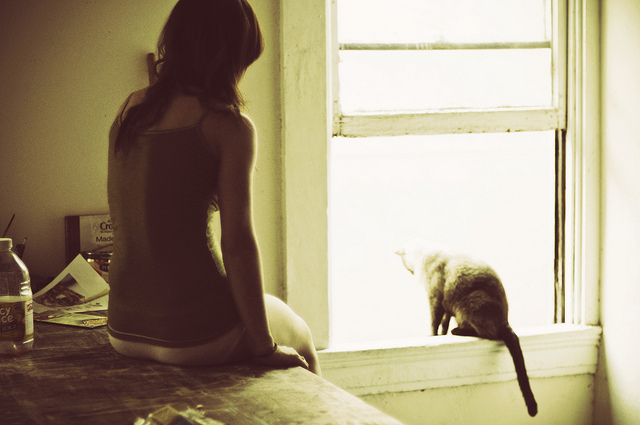Like many people in North America, I grew up valuing intellect and ignoring my heart, my true wisdom.
Part of the Shambhala teachings is learning how to trust ourselves. I laughed when I first heard this. I often consider myself a pretty suspicious person, trusting very little—least of all, my own gut.
How could I possibly trust myself when I second-guess my every move?
When we ignore our wisdom, we neglect who we really are. We push away our truth, our genuineness. We present the world with another version of ourselves, a disingenuous one. Meanwhile our heart, still beating away, is buried under piles of coping and defense mechanisms.
We hide who we truly are because we feel safer that way, curled up in what Shambhala teachings call cocoon. In Shambhala: The Sacred Path of the Warrior, Chogyam Trungpa Rinpoche says we create cocoon because we are afraid of facing our own fear. But instead of protecting us, this cocoon causes us much harm because we get stuck in our habitual patterns. As a result, creativity is suppressed, life is dull and we become disconnected from our true selves and from the rest of the world.
This causes much suffering.
How do we then connect with that inner voice, our wisdom, when we can’t actually hear what it’s saying?
Chogyam Trungpa Rinpoche says that slowing down our impulses is a good way to start.
In a world that seems to be speeding up, with more technological distractions than ever, this seems almost impossible.
But actually it’s quite simple.
Sit down.
Be with your breath.
Tune in.
Connect.
Listen.
One way to connect with this inner truth is through meditation practice. When we sit with ourselves, with our breath, we connect with our whole being. We tune into our body and we feel the sensations, from our feet touching the ground to the rhythm of our hearts. Is there any tightness in our bodies and where is it located?
From this discipline, our hearts begin to open. We begin to realize there is something speaking to us that is more powerful, something that extends beyond intellect, beyond our self imposed cocoon.
We start to wake up.
For a beginner meditation practitioner like myself, catching glimpses of this opening is essential to the awakening of wisdom. It is from this space that I begin to hear my wisdom and begin to trust myself.
Sakyong Mipham Rinpoche says we can choose to slow down at any moment by simply taking a look around, reflecting on our precious existence and taking control of our mind.
In his book Ruling Your World: Ancient Strategies for Modern Life, Sakyong Mipham Rinpoche encourages us to use our discernment. Without tuning into discernment, we get stuck in a pattern of making decisions based on whatever mood we are in. As a result, we make poor choices because we get caught up in these negative emotions, while losing connection with our true wisdom.
When we begin to trust ourselves, decision-making becomes easier and we can stick by what we’ve decided because there is less hesitation, doubt and second-guessing.
Opening up and trusting our wisdom leads to a feeling of curiosity about ourselves and others. We are able to look at our habitual patterns without beating ourselves up. We can open to experiences of the world without feeling like we need to protect ourselves.
How different it feels to know something is true in your heart instead of being overcome with doubt! With wisdom comes a relaxing into who we really are.
But Chogyam Trungpa Rinpoche says this type of relaxing isn’t the same thing as lying on a beach sipping a cocktail. Rather, it’s a relaxing of the mind by letting go of any anxiety and doubt about who we are. By realizing there is nothing inherently wrong with us—that we are good just as we are and there is nothing about us that needs fixing—this is truly learning to trust in ourselves.
When we can trust in ourselves, then we can begin to relax, let go and trust in the world, in reality.
There is an element of risk taking here. But it comes naturally. With this trust in ourselves and in our world, comes a willingness to be real, raw and vulnerable.
Eventually we learn that trusting our guts goes beyond our small-minded definitions of success and failure. We don’t have to keep spinning around in circles, clinging to our habitual patterns. It’s okay to be challenged and make mistakes. When we trust in our basic goodness, we are letting go and resting in our own wisdom. Second-guessing stops as there is no room for doubt.
There is a joyfulness that comes about when relaxing with inner confidence. Our energy, once used to keep us in our cocoons of worry and doubt, is now free to be creative and connect with others.
This is how we can courageously turn our hearts inside out and face the world.
Love elephant and want to go steady?
Sign up for our (curated) daily and weekly newsletters!
Apprentice Editor: Paige Vignola/Editor: Catherine Monkman
Photo: Tiffany Dawn/Flickr

 Share on bsky
Share on bsky







Read 1 comment and reply